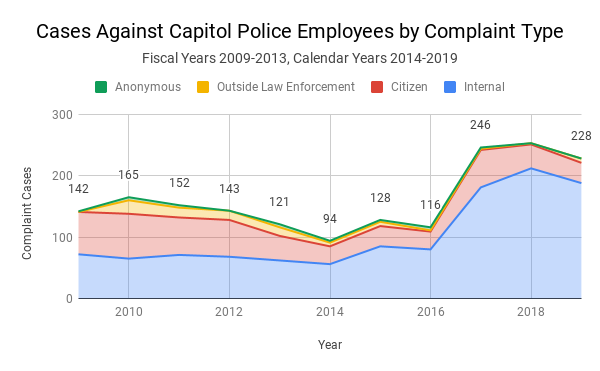The U.S. Capitol Police is notoriously opaque; among the limited information they will provide to the public are summary statistics on employee misconduct, published in their Annual Statistical Summary Report. This report provides a high level summary of the number of complaints made against USCP employees.
We requested a copy of the 2019 data in June, and it arrived in August, which is par for the course with USCP. Here is what the statistics show:
- There were 228 complaints filed against USCP employees in 2019, of which nearly 140 charges were sustained.
- More than 80% of complaints were filed by department employees; by comparison 14% were citizen submissions, and 3% were filed by outside law enforcement.
- There have been zero anonymous complaints filed in 2019, and the same was true in 2018. This suggests a problem with the way the anonymous complaints process works.
The report is compiled by the USCP’s Office of Progressional Professional Responsibility. We have the reports dating back to 2009, when is when the first report of this type of report was published. (Here is the data in a spreadsheet.)
The following chart depicts the total number of complaints against USCP employees. As you can see, the number of internal complaints have increased significantly in recent years. At the same time, the number of citizen complaints has decreased.

This year’s report was different from prior reports in two ways. First, it included a new data category, sustained charges, which the USCP describes as the “number of allegations, following a thorough Office of Professional Responsibility investigation, internal review, and employee appeal process that were upheld.” Second, the USCP omitted information concerning “separate charges/allegations.” This information, included in the prior nine annual reports, was a count of the different types of allegations per complaint.
In 2019, up to 60% of charges were sustained, or 137 charges out of 228 total cases. Please note that the terms are not the same: charges are not the same as cases. We do not know how many charges there were per case. (As we mentioned previously, that information had been contained in prior year reports.)
The USCP has been the subject of increased scrutiny this Congress. The House Administration Committee held a rare oversight hearing last year, and the Legislative Branch Appropriations Subcommittee included a number of welcome transparency and accountability recommendations in its FY 2021 committee report. In addition, Rep. Rodney Davis, the ranking member of the Committee on House Administration, has also introduced reform legislation.
Reforms proposed by House Appropriators include exploring creating a system whereby the public can request records from the USCP; releasing more information about the activities of the USCP Inspector General; publishing demographic information about people arrested and USCP employees; and reporting on USCP’s efforts to diversify its workforce.
Download the 2009-2019 complaint data as an excel file here. This article is an update of a 2019 piece on Capitol Police employee misconduct.